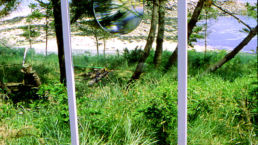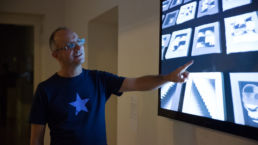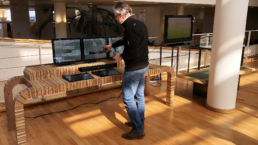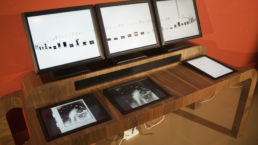Jean-Marie Dallet
Paris, France
Artist and professor at the University of Paris 1 Panthéon-Sorbonne in art, new media and interactivity.

Biography
Jean-Marie Dallet is an artist, curator and University Professor at the School of Arts of the Sorbonne, Paris 1. He is co-director of the work-study Master’s degree in Industry Management Art & Creative Industries.
He has exhibited his works and research in France (Biennial Artifices, Villette Numérique, Cité des Sciences et de l’industrie, Le Fresnoy, Le Confort Moderne, Faux mouvement, Le LAIT, etc.), in Belgium (Biennial Update), in Austria (Ars Electronica festival), in Canada (ISEA), in Japan (ICC biennial), etc.
His theoretical and visual work questions the notions of interactivity and the figures that organize their interactions, questions the archeology of the media and is today interested in political, artistic and educational issues related to internet networks and platforms.
He recently directed the publication of the book Cinema, interactivity and society (University of Poitiers and CNRS, 2013), Architectures de mémoire (Presses du réel, 2019), as well as the catalog of the exhibition of which he was the curator, Living memories. From Nam June Paik to SLIDERS_lab (Lannoo, 2019).
Jean-Marie Dallet is a member of the collective of artists SLIDERS_lab which takes into account an emerging aesthetic territory around animated images, memory, archiving and digital. An approach that currently extends to contemporary forms of representation and navigation in audiovisual collections.
Answers from Jean-Marie Dallet
Jean-Marie Dallet, I am an artist and I am also a university professor at the University of Paris – Panthéon-Sorbonne. My field is that of art in general and more particularly my field of expertise is the field of new media, of interactivity that I encountered in the early 90s.
A training in creative media is relevant today, it has been so for a long time, one could say that young artists, aspiring artists, I encountered an exhibition called Les immatériaux and which was therefore directed by Jean-François Lyotard. It was 84-85 and Jean-François Lyotard had written in 1979 the “postmodern condition” and already announced the world of today, that is to say a digitized world. He announced this paradigm shift where knowledge would also be digitized and therefore would be economically profitable. He announced what are called the ICCs, so today it is all the more true as the world has completely changed, the digital world today, but no one will be able to deny it. And this new world even, even if “new”, it is necessary, as I said to you, to relativize since it is already since the Sixties, end of the Seventies, calls for new competences, new knowledge and especially transmissions of knowledge that precisely allow young people to train in the sectors of image, still images, images, movements, 3D images with professionals, whether in creation, whether in programming, and whether in management.
There would be four terms for me, there would be creation. There would also be the universe of programming which is a complex evolving universe. The world of management and the world of law.
For me, there is one thing that would be very important, in any case, in these questions, it is rather the question of initial knowledge at the start and especially the question of culture.
I think that today, we must interest young people in the history of the arts in the broad sense: the history of the arts is not simply a history of painting and sculpture, but c is also the history of cinema, the history of photography. Today, it would also be the history of video games. I think that it is necessary to have this range of knowledge to manage precisely to open the spirits to precisely allow the invention.
Then, the know-how is more or less known, there is a lot of know-how that affects the image professions. So the manipulation of certain applications, whether in cinema, video, etc… I’m not going to name them, but they are known. A very famous suite which includes some of them. But then, if we look at video games, we have some more specific software for creating worlds. So, indeed, we have to develop this know-how so that young people can handle it and be accompanied by professionals, by artists, I specify, not simply by technicians, but by artists who will precisely manage to give sensations and not just knowledge. A practice, yes, but a sensitive practice. So that is very important. Then, in terms of the capacity to conceive, indeed, that’s a bit of a management part. And so, you have to manage to do it right away, with people in a bit of a teamwork configuration so that they can talk to each other. Because we can clearly see that the vocabulary of someone who is more attracted by painting or by cinema, or by drawing or by video games or by programming, is absolutely not the same. So there has to be a kind of common language. And the earlier they work together, the more they will be able to discover this language and progress. And then afterwards, the projects are in teams, so it’s important. As for the ability to achieve, it is something that is not easy to transmit, because I worked with someone in the 90s, whose name was Jean-Louis Boissier, who was a curator, but also a teacher who was the first to do interactive art exhibitions, exhibitions not festivals. And he always told me: There are people who can’t finish. And what he appreciated in me, I think, was also this ability to finish things, to finalize them. So how do you convey this? That’s a real challenge for teaching teams, because there are people who never know how to finish. We can, we can talk about Proust, for example, we know very well that if the manuscript of In Search of Lost Time had not been snatched from Proust’s hands, he would still be working on it today. So I think it’s also the environment, the work context that means that at some point, we have specific dates that fit the work a little. And you have to have around you people who manage and who say “well, that’s good, we’ll stop there. “. Because a creator never ends.
So the evolution of creative media is always difficult, I must not be the only one to think that, to try to imagine the future because we are immersed in a context that is already changing.
I think that today, for having participated in several international competitions, where we selected young artists. Artificial intelligences, for example, I have seen many young artists who stage artificial intelligences. I think it’s something that needs to be developed today.
Then there is the question of robots. Robots are more and more present and are around us, we don’t see them too much, but this question of robots is a question which is happening and which is already developing.
I am thinking of the question of interactivity, of course, which is an essential question because it is not simply a question of setting up a technique that reacts. But we can clearly see that the question of interfaces for the construction of worlds to be touched or explored is part of a new language, a new ergonomics, as we say among designers, which it is essential to develop and understand young learners.
Then, there is one last point no doubt, it is the question of the development of 3D worlds. We talk a lot about multiverses, it’s something we’re going to develop tomorrow.
As for technological revolutions, I touched on it a bit earlier. I think that in the whole field of robotics, artificial intelligence, 3D worlds, we can clearly see that today, every year, there are generations of new helmets that appear today wirelessly. We even saw a manufacturer offering shapes of 3D glasses etc. So we feel that there is an agility, a technicality that is at work and which is very pleasing, I find for invention, in any case.
Next, for the conceptual worlds. I also approached a bit all this new language, this new vocabulary which was born at the beginning of the Nineties with the action of the interfaces. We will not forget since we no longer see them, but all the invention with CD-ROMs which finally created ways of consulting different digital books, which we find today in our iPhones, in books that we can say “increased”. All of these are languages that have been born and will continue to develop. Because, who says new technologies, new tool. I prefer the word “tools” to “technologies”, we engram, we will finally continue the transmission of prior knowledge through these tools and therefore we will increase the languages.
And from a conceptual point of view also today, if we talk about invention, I will talk. So that is a whole, a whole discourse on precisely the worlds in which we are going. Today, we are predicted anyway that in 2030, it will be a disaster, ecological disaster, social disaster. Robots, social, ecological, the CO2 crisis. Today, we could say that we are preparing young learners for “creative media” and that we should integrate questions of geoeconomics, geotechnics, that is to say how ecology will fit into these technologies and how , finally, this pressure from the environment, this urgent pressure, will modify us. And that, I must confess to you that today, I am talking about it, some are talking about it and that we do not see a global solution. So it will change a lot in the next 10 years.
If I had to employ people from this master, yes, with great pleasure. Why ? Because the big problem with organizations is that they lack flexibility. That is to say that if we work with a design sector, if we work with an engineering sector, if we work with a commercial sector, in fact what is missing is what is in the middle, that is to say the void. These are the people that this type of training creates, that is to say people who are both managers at the same time, creative people at the same time, engineers who understand languages. So, in these collectives, they are essential. These are essential cogs.
What more could we invent? What more could we put to the test to increase this type of training? It’s difficult and I think to come back to what I was saying earlier about this ten-year future. So I think what needs to be invented today is to increase the ability of young learners to work together, to be collective, not to remain, let’s say, as they say before the Copernican revolution, egocentric. It is precisely necessary to lose this “centering”. We have to decentralize because we are going to need creative people to precisely work with other bodies in society to precisely improve the way in which we are going to combat these ecological issues.
When I say the ecological question, we are not fighting ecology, but how are we going to fight precisely to improve the world?
